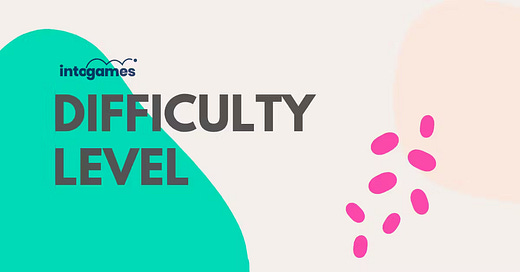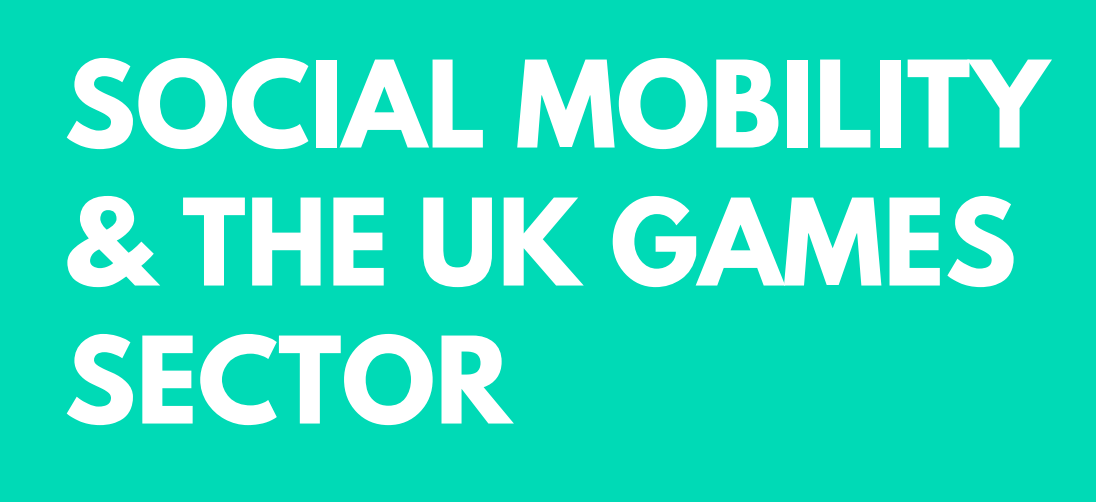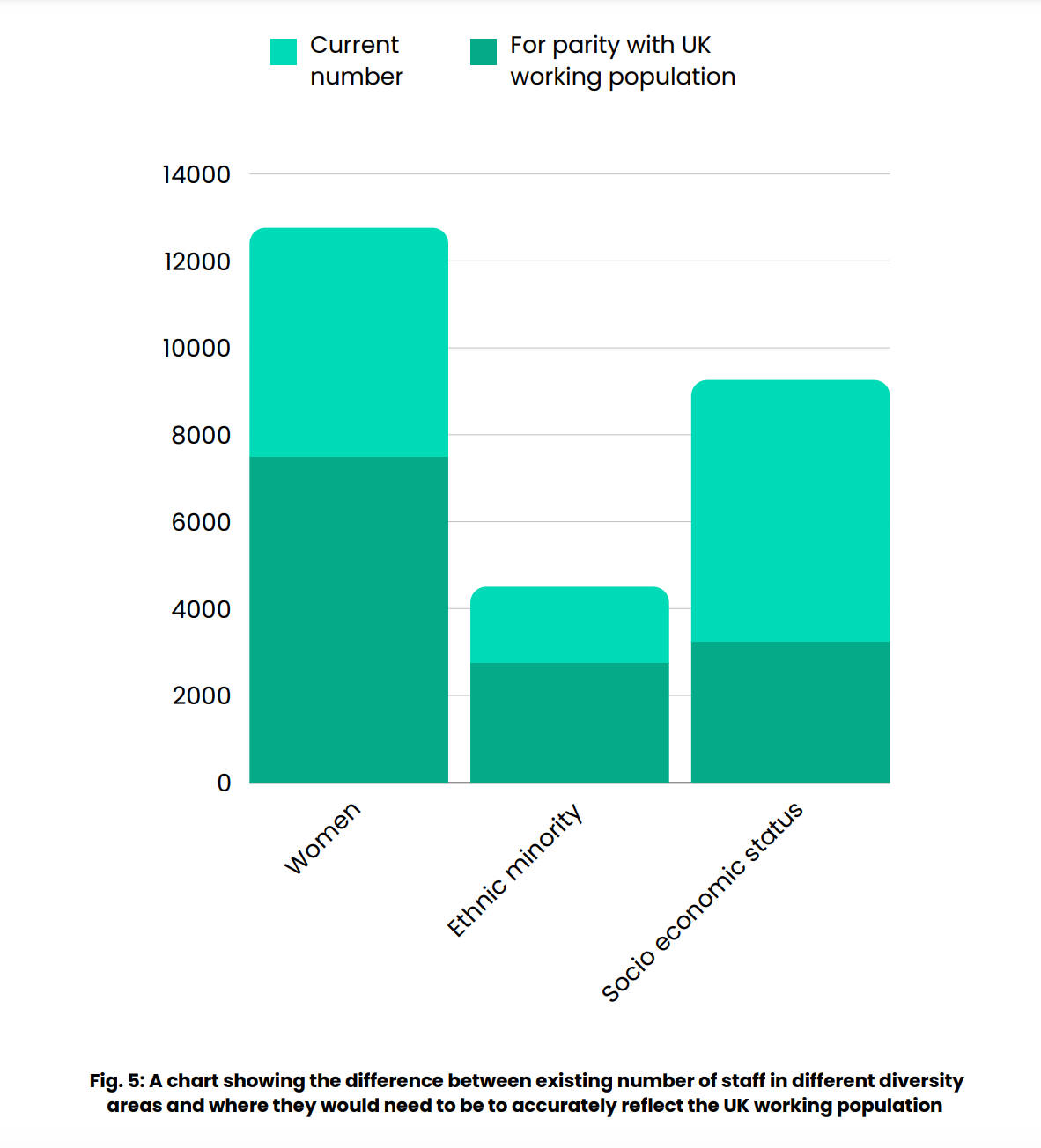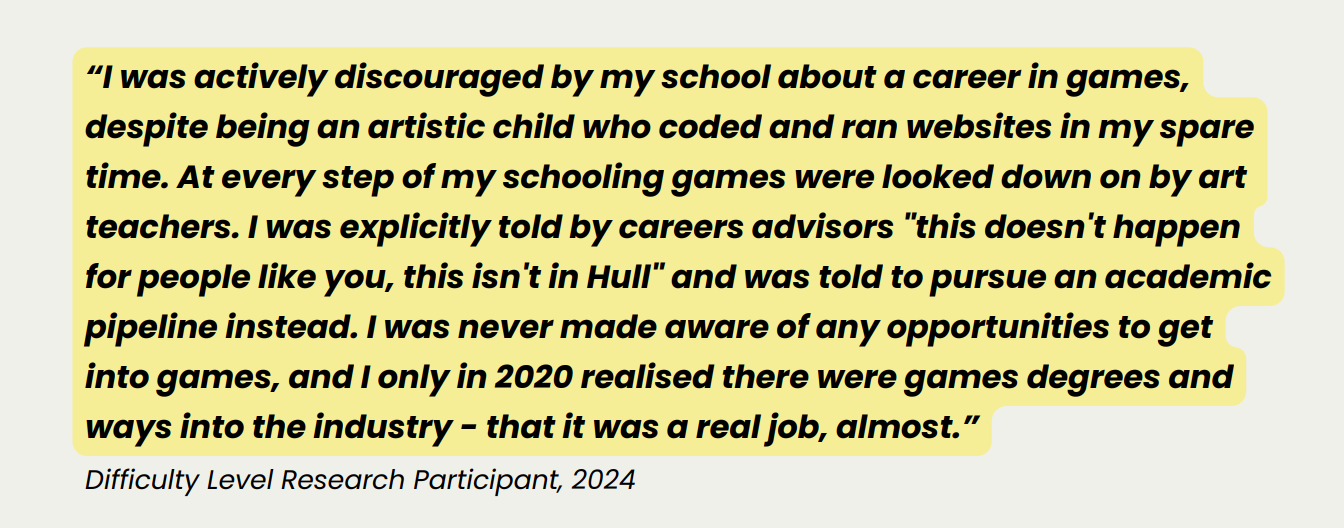
Exclusive: Unpicking the UK games industry’s class problem, 24/10/2024
And we're not talking about bards or paladins here
We get an exclusive look at new Into Games report about the UK games industry’s class problem
Call of Duty: Black Ops 6 shoots its way to the top of the release schedule
Rollo Romig’s piece about video game menu design cleanses our collective palate
Hello VGIM-ers,
I hope you’re doing well. As promised, I’m taking the tail end of this week off to rest up and recover after a month of international travel.
That means this week’s newsletter will be a little shorter than usual, with the news in brief and job sections taking a brief hiatus to allow me to get some well earned rest.
But while I might be resting, VGIM never does.
That’s why I am excited to announce that submissions for VGIM Game of the Year are open - giving you the chance to get your game review in the final newsletter of the year.
The premise, for those of you who weren’t on the VGIM mailing list Last Christmas, is simple.
You pick your favourite game from the past 12 months (which either released this year or benefitted from a substantial content update), scribble 200 words about why you liked it and email it to me.
I then pick the top reader reviews to feature in the final newsletter of the year, giving all lucky people selected the chance to lord it over friends, family members, co-workers and enemies before 2025 rolls around.
If you want some inspiration on what to write, I recommend reading last year’s Game of the Year newsletters dedicated to the top tentpole titles and top indie titles.
And importantly, you don’t have to be in the games industry to get your review featured in the newsletter.
Last year’s write-up featured insight from a bestselling author, the news editor of a leading political media outlet and a BBC weather presenter - so don’t be shy about submitting whether you’re in games or not.
Ready to put forward your review for consideration?
Email george@videogamesindustrymemo.com before Friday 29th November with your words and may the odds, as ever, be in your favour.
And with that done, who fancies a VGIM exclusive about social mobility and class then?
The big read - Exclusive: Unpicking the UK games industry’s class problem
We have known for years that the UK games industry has a class problem.
Since the first UK Games Industry Census launched in 2020 the industry acquired a reputation as one of the “poshest” professions in the country, with roughly double the number of people working in games reporting that their parents worked in a ‘managerial or professional’ occupation - a key class indicator - than the national average.
But despite knowing that there has been a problem with the sector’s class make-up for nearly half a decade, little has been done to resolve it.
Aside from a handful of investigations from outlets such as People Make Games exploring the issue and piecemeal targeted interventions from some studios, the awkward problem of the industry’s class make up has barely been discussed or digested since it first emerged.
A new report released earlier today aims to change that. Into Game’s Difficulty Level has surveyed 297 working class industry professionals - and conducted 17 one-to-one interviews with members of the cohort - to understand their experiences growing up, their efforts to get into the games sector and the problems they had to overcome to achieve their goal.
VGIM was given an exclusive early look at the report and its findings. And unfortunately for the games sector, it was damning in many ways.
According to Into Games’s research, just 13% of the UK video games industry workforce are drawn from lower socioeconomic backgrounds: meaning the industry is roughly a third less inclusive than the wider country.
Of those people working in games surveyed for the report, 59% reported that they felt looked down upon as a result of their social background when working within the business. And fewer than 5% believe the sector is doing enough to resolve the challenges that they face - leaving them to overcome significant hurdles to enter an industry they love.
So what exactly is causing all of this? As Difficulty Level suggests, the problem is multifaceted but is made considerably worse by industry inaction over the issue - leaving the sector with plenty to do if it wants to be more equal in regards to social class.
Shameful statistics
Straight off the bat, it is worth hammering home how bad the UK games industry’s class make-up is in comparison to the wider population.
As mentioned up at the top of this newsletter, Difficulty Level reports that just 13% of the games industry comes from a lower socioeconomic class. By contrast, 37.4% of the UK population is drawn from such categories: a clear chasm in representation within the sector.
This figure, obviously, isn’t great. Unfortunately, it looks a lot worse when you begin to compare it with other sectors too.
Within the rest of the creative industries, 29% of people who work in Film & TV, 32% in Design and Fashion and 22% within the music industry come from a lower socioeconomic background - leaving the games sector as an awkward outlier.
To some extent, this is partially explained by the presence of roles within each of those industries that align with education and career paths that have traditionally been more open to people from lower socioeconomic backgrounds.
For example, film and television production still relies on the physical production of sets which require skills like carpentry.
Games - a highly skilled digital profession in which 82% of people hold a minimum of an undergraduate degree - has fewer of these roles by comparison, leading it to trend away from the national average in the process.
However, the games sector also performs badly when set against industries that have traditional associations with power, prestige and conservatism in terms of a class background.
The sector has fewer people from lower socio-economic backgrounds working within it than the UK’s civil service (18% of workers), within law (17%) or in the accounting sector (17%).
And while it is clear that, again, the comparatively less technological nature of these professions does open up alternative routes to entry (such as apprenticeships in accountancy or the civil service), it is alarming to see games still comfortably less representative in terms of social class than professions typically perceived to be less inclusive within our national conversation.
As a result, Into Games reports that it believes that “socio-economic status may be the most important diversity issue [for the games industry] to tackle” given the chasm between the industry’s figures and wider society. This includes well reported problem areas in the sector’s diversity make-up, such as the lack of women working in games or its representation of black individuals.
But what precisely is driving this inequality? Over the course of Difficulty Level, Into Games argues that three intersecting challenges which affect the outlook of just about everyone in the country - individual circumstances, institutional structures and industry action - combine in a particularly noxious manner within games: creating major barriers to entry for people from lower socioeconomic backgrounds.
Worst in class
At an individual level, the factors that lead to someone being identified as from a lower socioeconomic background - namely, their household income growing up, what type of school they went to (e.g. did they go to a non-selective state school) and what their parents do for a living (i.e. were they in a managerial professional role like a doctor or teacher or working in a craft like being an electrician) - lead to particularly pronounced problems for someone looking to enter games.
Across the course of the report, the qualitative insights included in Difficulty Level show that people from lower socioeconomic backgrounds face bigger challenges when it comes to accessing the technology, skills and inspiration necessary to consider a career in games.
For example, one person working in games said that they got their first computer after their mother rescued discarded devices from the bins behind their local school when they upgraded their computing lab.
Another individual talked about how their education pathway was disrupted in their late teens because they had to take a job to make up for the loss of household income caused by them being too old to qualify for child benefit.
One respondent even talked about how a careers advisor actively discouraged them from thinking about a career in games, despite their interest in the medium and their artistic and development skills, because it wasn’t apparently the kind of thing that someone from their area of the country should think about.
Individuals from lower socioeconomic backgrounds already face bigger barriers to entering the games industry than those who aren’t. And unfortunately, those challenges are worsened by wider institutional problems within the UK - particularly within education - that decreases their chances of entering the sector.
As already mentioned, patchy careers advice in schools is a consistent problem for talent from lower socioeconomic backgrounds.
Over the course of Difficulty Level, respondents consistently raised how little careers advisors knew about the possibility of a job in the games industry, how little they valued creative jobs in general and how advisors tended to naturally cap the ambition of the people they were speaking to.
While children who are privately educated have their horizons expanded, careers advisors in state schools - as I unfortunately experienced on many occasions at the battery farm for kids I attended in my later years - tend to diminish them: widening the gap in inequality.
Additionally, there has been a significant reduction in funding which could support the development of talent from lower socioeconomic backgrounds within games.
The abolition of maintenance grants for university degrees, which allowed individuals from low income households to go to their choice of institution essentially for free, in favour of loans has diverted working class talent from higher education.
Given the aforementioned figure of how many people in games hold at least some form of undergraduate degree, this naturally decreases the chances of someone from a lower socioeconomic background having the ‘right’ qualification - whether in a games related degree or otherwise - from entering the industry.
Meanwhile, the winding down of the Kickstart scheme post pandemic, in which employers received six months of cash to support internships within their companies provided they hired through a job centre, whipped away a source of support that saw nearly 200 people get their first job in the business between 2020 and 2022. The failure to replace it has been quietly lamented by the sector for years.
But while both individual and institutional problems do present a problem for access to careers in games, their effect could be limited by industry action that could solve some of the challenges, such as low quality career advice or access to free work experience for junior talent, facing people from lower socioeconomic backgrounds.
Unfortunately, Difficulty Level argues effectively that industry action to resolve the challenges facing people from lower socioeconomic backgrounds doesn’t meaningfully exist.
Across the course of the report, it highlights how the industry has no dedicated representative group or organisation aimed at supporting working class talent - despite the obvious lack of representation within the wider sector.
It shows how industry careers advice and outreach is hampered by immense secrecy over how games work and the lack of a strategic plan to reach talent, leaving schemes like the Video Games Ambassadors trying to deploy its 800 members as effectively as possible to plug the gap.
And it demonstrates how the challenges facing individuals from lower socioeconomic backgrounds are often overlooked, such as a failure to consistently offer talent from poorer households a front loaded relocation package to help them overcome challenges.
This is a major reason why people from working class families feel less included within games. And with fewer people from such backgrounds working within the industry, it also doesn’t come as a big surprise that they often inadvertently feel unwelcome or excluded - something which risks exacerbating the problem further.
This isn’t to say that there is no action across the industry aimed at resolving these challenges, of course.
Difficulty Level highlights the work of The Chinese Room in running an entry level internship scheme aimed at talent from lower socioeconomic backgrounds, while also noting the work of grassroots organisation Esports Youth Club in increasing access to games for working class talent in London.
But what Difficulty Level communicates effectively is that the industry clearly has a blind spot within its diversity and inclusion efforts in regards to social inequality. This means it needs to take concerted action to resolve the problem as effectively as it can.
Class action
How do we address the problem then? Understandably, the breadth of the challenge is enormous and it is reasonable to say that industry can’t solve the challenge alone.
In the conclusion of the report, Difficulty Level makes a series of recommendations across a variety of policy pillars - including recommending the creation of a refreshed Kickstart scheme and refreshing the delivery of careers advice in school - to advise Government on how to support the creation of a more socially inclusive industry.
This is a reasonable and sensible thing to do. In a happy coincidence, a new report from the Co-Op and Demos released earlier this week found that social inequality costs the UK economy £19bn a year.
With video games jobs creating an average of £122,000 of gross value add to the British economy each year according to the BFI, there’s an opportunity to align messages about the economic value of social mobility within games to lobby for meaningful policy change.
Unfortunately though, the reality is that the current funding environment makes these recommendations a hopeful best case scenario rather than an achievable plan.
Rachel Reeves, the UK’s Chancellor of the Exchequer, is delivering her first budget next week after inheriting a multi-billion pound black hole in the public finances. Securing new funding to resolve the challenge is unlikely and, at this moment in time, unrealistic.
Instead, the sector must look within its borders to see what it can do to turn its currently lacklustre response to the challenge of social inequality into something much more effective.
To this end, there are a number of suggestions within Difficulty Level about how industry could better help people up the social ladder. And in particular, I was drawn to three recommendations in particular which hit the sweet spot of being both a valuable intervention and eminently achievable within the current climate.
First, the foundation (and funding) of an industry wide campaign to boost social mobility would be an excellent starting point.
Whether this is done through Ukie’s rebooted Raise The Game diversity initiative or via a new body, funding and supporting a group to represent the needs of people from lower socioeconomic backgrounds and setting it a target for improvement - such as mirroring Big Four firm KPMG’s goal of ensuring 29% of its workforce is hired from lower socioeconomic backgrounds - would provide a focal point for effective long term action on the issue.
Second, using this group to provide businesses with clear best practices on how to find, hire and support talent from working class backgrounds would be invaluable.
As well as helping to connect industry to education in a way which ensures up and coming talent clearly understands the opportunity, disseminating to studios advice on what practical support such talent may need (e.g. access to a relocation package) and bespoke pathways that are more likely to appeal to their likely educational background (e.g. funded internship programmes) will help companies create effective plans to support their entry into the industry - creating a foundation for long term improvement on the issue.
Finally, the recommendation for targeted cluster based action on the issue across the UK via the implementation of multi-disciplinary ‘waypoints’ is a smart way to turn a purposeful goal into practical action.
By identifying six clusters such as Middlesbrough, Birmingham and Dundee which are particularly effective supporters of talent from lower socioeconomic backgrounds, Into Games raises the possibility of targeted on-the-ground interventions which bring together businesses, schools and social mobility specialists such as The Sutton Trust, The Social Mobility Foundation and The EY Foundation to tackle the problem holistically.
This creates a meaningful framework for long term change within each cluster. But even more importantly, it raises the possibility of intersectional action in certain areas where class issues intersect with other inclusion considerations, such as ethnicity.
This, in turn, could lead to plans for how to better engage South East Asian communities in Birmingham Eastside or Black communities in Croydon - creating a valuable force multiplier effect for industry inclusion efforts at large in the process.
Of course, industry can’t resolve this challenge alone. Social mobility has steadily worsened in the UK for the best part of four decades now, which means that the Government needs to get a grip on the issue in both areas directly related to games (e.g. education) and within indirect areas that contribute to individual growth (e.g. affordable housing).
But given the industry’s clear representation issue and obvious inaction on the topic, it is clear that we can’t wait for others to come along to resolve the problem.
And with Difficulty Level demonstrating that industry inaction on socio economic representation is the norm, now feels like a good moment to turn hushed conversations about the sector’s class make up into an open dialogue about how we effectively tackle the issue in the years to come.
Read Into Games’s Difficulty Level report here.
Events and conferences
AI and Games Conference, London - 8th November (SOLD OUT)
PG Connects, Jordan - 9th-10th November
G-Star 2024, Busan - 13th-17th November
Slush, Helsinki - 20th-21st November
The Game Awards, Los Angeles - 12th December
Games of the week
Call of Duty: Black Ops 6 - Experience the glory of the first COD game to feature Bill Clinton on all platforms (suck on that, The Competitions and Markets Authority!)
Sonic X Shadow Generations - Shadow the Hedgehog returns in the latest entry in the somehow still alive Sonic series.
Date Everything - Live out your wildest dating dreams on the go with the Nintendo Switch port of this positively received PC game.
Before you go…
Mmm, who loves tasty video game menu designs? I do. And so, as it happens, does Rollo Romig.
In a recent piece for The New York Times, he delights in the design of the screens in between in Metaphor: ReFantazio - unpicking how Koji Ise, Lead Interface Designer at Atlus, used diverse influences such as the work of Leonardo Da Vinci to bring the game’s pause menus to remarkable life.









